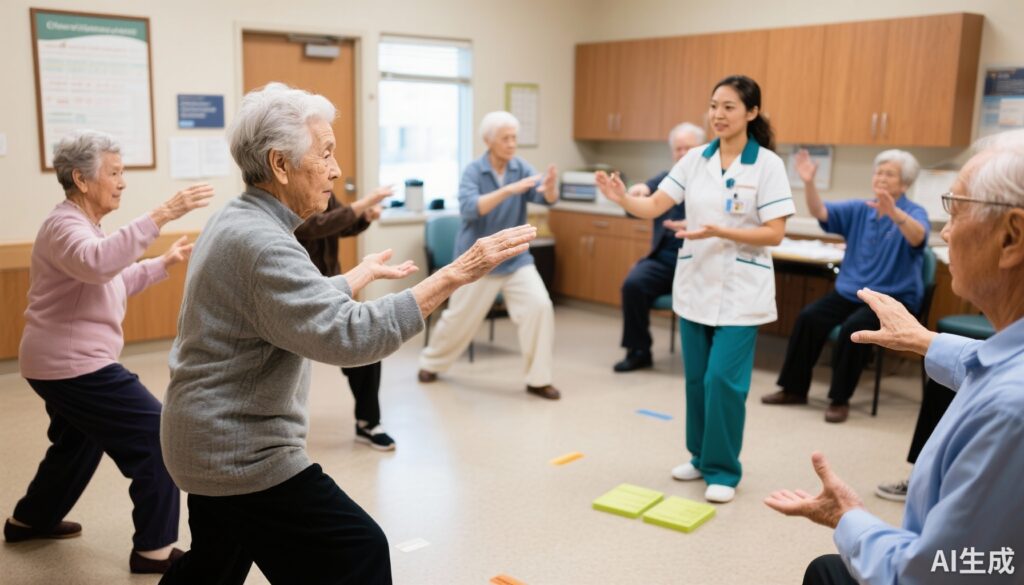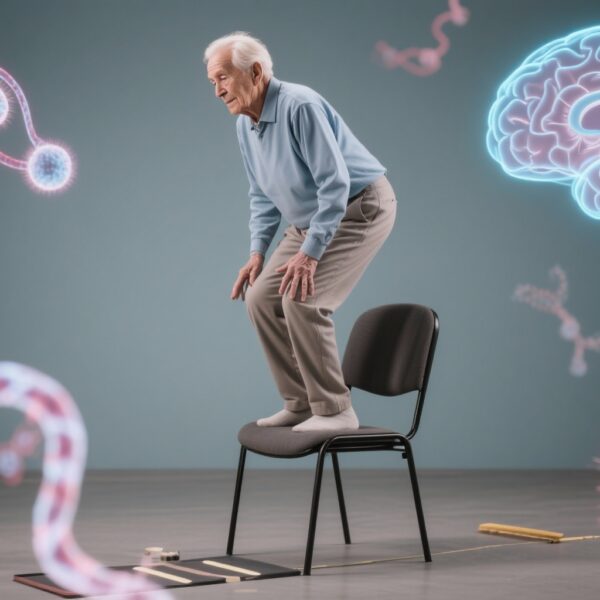Highlight
- The study compared a multi-component intervention (combined cognitive training, mind-body physical exercise, and nurse-led risk factor modification) with nurse-led risk factor modification alone and general health advice in older adults with mild cognitive impairment (MCI).
- No statistically significant differences were found among the three groups in cognitive outcomes measured by ADAS-Cog at 15 months or at earlier follow-ups.
- Results suggest that incorporating these interventions into primary care requires further refinement and evidence before recommending widespread implementation.
Study Background
Mild cognitive impairment (MCI) represents a transitional cognitive state between normal aging and dementia, characterized by measurable cognitive decline not severe enough to impact daily functioning substantially. With an aging global population, the prevalence of MCI is rising, posing a clinical challenge as these individuals carry an increased risk of progressing to dementia. Currently, there are no definitive pharmacological treatments to halt or reverse MCI progression, and non-pharmacological approaches, including cognitive training and physical exercise, have been proposed to delay cognitive decline.
Nurse-led risk factor modification (RFM) programs targeting vascular and lifestyle-related risks have potential for mitigating cognitive deterioration. However, the effectiveness of nurse-led RFM interventions, both alone and combined with other interventions like cognitive training and mind-body physical exercises such as Tai Chi, remains uncertain in real-world primary care settings. This context motivated the present randomized controlled trial (RCT) conducted in Hong Kong to evaluate whether combined mind-body exercise, cognitive training, and nurse-led RFM (CPR) yields superior cognitive benefits compared to nurse-led RFM alone or general health advice.
Study Design
This open-label, blinded-endpoint RCT was conducted over 15 months at the Lek Yuen Health Centre, a university-affiliated research and training clinic in Hong Kong. It enrolled community-dwelling older adults aged 60-80 years, with mild cognitive impairment defined by a Hong Kong Montreal Cognitive Assessment (HK-MoCA) score between 19 and 25 and stable physical health.
A total of 456 participants were randomized 1:1:1 into three groups:
- CPR group: received combined cognitive training, Tai Chi exercise thrice weekly for 3 months, and quarterly nurse-led RFM plus biannual primary care physician visits.
- RFM group: received quarterly nurse-led risk factor modification and biannual primary care physician visits.
- Health Advice group: received booklets with general health advice only.
Assessment time points included baseline, 6, 12, and 15 months. The primary outcome was cognitive function assessed by the Alzheimer’s Disease Assessment Scale-Cognitive subscale (ADAS-Cog) Z-score at 15 months. Secondary assessments examined changes at 6 and 12 months. The study used a modified intention-to-treat analysis including subjects completing at least one follow-up evaluation. Linear mixed-effects models adjusted for multiple comparisons with Bonferroni correction were applied. Assessors and data analysts were blinded to group allocation.
Key Findings
Between October 2019 and December 2022, 456 participants were randomized: 152 to CPR, 152 to RFM, and 152 to health advice. The analytic cohort comprised 423 participants with at least one follow-up: 139 CPR, 144 RFM, and 140 health advice. Participants’ mean age was 70.1 years, with a predominance of females (72%).
The primary analysis found no statistically significant differences in ADAS-Cog Z-scores at 15 months between the three groups:
- CPR vs health advice: β= -0.04 (95% CI -0.34 to 0.26)
- RFM vs health advice: β= -0.14 (95% CI -0.44 to 0.15)
- CPR vs RFM: β= 0.10 (95% CI -0.19 to 0.40)
Similarly, no significant cognitive benefits were observed at 6-month or 12-month evaluations. These results suggest that neither the addition of combined cognitive training and Tai Chi mind-body exercises to nurse-led RFM nor nurse-led RFM alone improved cognitive function more than standard health advice over a 15-month timeframe.
The study did not report significant adverse events related to interventions, underscoring the safety of these approaches. However, the lack of demonstrated efficacy raises concerns about resource allocation and patient burden inherent to multi-component programs without clear cognitive benefits.
Expert Commentary
This well-designed large-scale RCT addresses an important clinical question in the primary care management of MCI. The multidisciplinary intervention combining mind-body physical exercise, cognitive training, and nurse-led risk factor modification intuitively targets multiple mechanistic pathways implicated in cognitive decline, such as vascular health, neuroplasticity, and physical fitness.
However, the absence of statistically or clinically meaningful cognitive improvement may reflect several factors. The 3-month duration of intensive Tai Chi and cognitive training may have been too short to effect durable neurocognitive changes. Adherence variability and the open-label design, albeit with masked outcome assessment, may also influence outcomes. Further, MCI is a heterogenous condition with variable trajectories, potentially diluting intervention effects in a broad primary care population.
Current clinical guidelines recommend individualized risk factor management and promoting physical and cognitive activity, but evidence for specific structured multi-component interventions in MCI remains insufficient. Future research should explore longer or more intensive intervention protocols, stratify patients by risk profiles or biomarkers, and investigate synergistic effects with pharmacotherapies.
Conclusion
The present trial indicates that a combined intervention of mind-body physical exercise, cognitive training, and nurse-led risk factor modification did not significantly enhance cognition above nurse-led risk factor modification alone or health advice among older adults with mild cognitive impairment in primary care settings. These findings emphasize the need for further refinement and robust evaluation of multi-component non-pharmacological interventions before widespread recommendation or implementation. Continued efforts are necessary to develop effective, feasible, and scalable strategies to mitigate cognitive decline in aging populations.
Funding and Clinical Trial Registration
The study was funded by the Health and Medical Research Fund. It was preregistered at the Chinese Clinical Trial Registry under identifier ChiCTR 1900026857.
References
Xu Z, Zhang D, Yip BH, Lee EK, Poon PK, Peters R, Yang Z, Lee AT, Leung MK, Wong EL, Mok VC, Lam LC, Wong SY. Combined mind-body physical exercise, cognitive training, and nurse-led risk factor modification to enhance cognition among older adults with mild cognitive impairment in primary care: a three-arm randomised controlled trial. Lancet Healthy Longev. 2025 Apr;6(4):100706. doi:10.1016/j.lanhl.2025.100706. PMID: 40294622.


